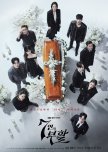
The Escape of the Seven: Resurrection
36 people found this review helpful
Fake news, questionable morality, and troublesome technology
"The Escape of the Seven" was an organized mess that had all the "charm" of a sinking ship. There were plenty of moments that threatened to send me scrambling for the nearest escape route (the poor character development, repetitive conflict, pseudo-romantic encounters, rushed redemption arc), and plenty of others that managed to serve up food for thought on the human conditionOne moment of revelation was the ill-fated character "K," who was swapped at birth and brought up in a wealthy household. After discovering his origins, he was discarded by his once-doting family. K's words, "noone can be family unless you're related by blood" (episode 12, 32:34) and "since I was young, I was the one to entertain and serve Father, why am I the fake son?" (episode 12, 39:25), invite us to question society's obsession with "biological lineage." Far too often, adoptive families or children are seen as "less worthy." The pursuit of a biological "mini-me" takes precedence, as if blood were the determinant of familial bonds. This skewed perception belittles the love, commitment, and joy found in adoptive families
Another moment was the dichotomy between "the real and the fake" (episode 12, 39:00). The drama reminds us that no matter how convincingly something mimics reality, there will always be a distinction. Even if it looks like a duck, swims like a duck, and quacks like a duck, it might not be a duck
The drama considers our unhealthy relationship with technology and the ramifications of unchecked technological advancements. It draws attention to humanity's "vulnerability" to the influence of fake news (episode 12, 15:16), a significant issue in the modern, tech-driven society
In conclusion, "The Escape of the Seven" was a blend of misguided, cringe-worthy storytelling and surprising insight. It had both irredeemable and redeeming qualities
Was this review helpful to you?
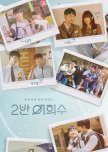
A promising yet unfulfilled journey
Prior to touching on any unfavorable points in the adaptation, I would be remiss not to praise the decision made by Ahn Ji Ho and Lee Sang Jun to take on roles that break the conventional heteronormative mold. Special recognition goes to Ji Ho, who, having starred in a popular mainstream Zombie drama "All of Us Are Dead," shows immense courage in embracing a non-straight role and sets an example for other mainstream actors. The interaction between these men is endearing. Sang Jun (Seung Won in the drama) is a timid/shy, lovesick admirer, striving to capture Ji Ho (Hee Su in the drama)'s attention. Much like the source material, drama Seung Won's motive for approaching, reaching out to, and confiding in drama Hee Su is to spend more time in his company and reveal his feelings for himSeung Won: "I don't like Ji Yu"
Hee Su: "Why did you lie?"
Seung Won: "Because I wanted to keep hanging out with you" (chapters 42-43)
A screenshot: https://imgur.com/a/7ElUfSX
Drama Seung Won, too, gently nudges drama Hee Su to confront his true feelings and discover the solace and true love that await him in Sang Jun (Seung Won)'s arms
Apart from Ji Ho (Hee Su) and Sang Jun (Seung Won)'s chemistry, a praiseworthy part is drama Hee Su's compassion. In the first episode (5:10-7:04), he listens without prejudice to a woman struggling with her feelings for another woman. There's something extraordinary about the scene. It's become one of my favorites!
Now, this might be a contentious point. I find that the actors’ and actresses' appearances don’t match the youthful roles they’re playing. Without a doubt, they're good-looking, but they give off the impression of being older and in their mid/late twenties or early thirties. Their seasoned, mature appearances prove challenging to reconcile with their student status. And watching them cosplay as high school students sometimes stretches my ability to suspend disbelief to its limits. An effective approach could've been to set the story in a workplace or university
I can be lenient with these matters, most high school dramas/movies have the same problems. What troubles me is the pacing and the straightwashing or forced feeding of "straightness" to cater to the squeamishness of homophobic mainstream audiences wary of encountering too many rainbows on their screens. The pacing of the gay storyline is sluggish compared to its "straight" counterpart, suggesting an uneven distribution of resources and dedication from the producers. It's not until the seventh or eighth episode that the emotional bond between the gay couple undergoes transformation. The adaptation struggles with maintaining the integrity of the source material, a problem worsened by the presence of a "straight" storyline
The source material doesn’t even feature a "straight" storyline between Chan Yeong and Ji Yu. I find the insistence on shoehorning one into the narrative, and replacing Sun Woo and Yoo Dahm’s (the second gay couple's) storyline, unforgivable. A screenshot of Sun Woo and Yoo Dahm from chapter 56: https://imgur.com/a/OInfwbQ
How mind-boggling it is that we're accused of "destroying" friendships for shipping characters of the same sex who are "just friends" in their source materials when society destroys or hints at destroying man-woman friendships in favor of non-platonic storylines with nary a consequence. Friendships between men and women, boys and girls, are meaningful and don't require a non-platonic downgrade. Chan Yeong and Ji Yu serve Hee Su best as supportive friends. Inserting a "straight" angle between them detracts from Hee Su's journey. This story, "Heesu in Class 2," belongs to Hee Su and his love interest, Seung Won, and shouldn't be hijacked or distorted by a superfluous "straight" storyline
Some might defend the erasure of the second gay couple from the adaptation, citing that their storyline occurs in the second season of the source material. It's a dubious, flimsy excuse at best. The screenwriters were capable of fabricating a "straight" storyline involving Chan Yeong and Ji Yu. It would've been prudent to use the creativity and merge key elements of the two seasons into the 10-episode adaptation. The creative process of converting the Manhwa into a drama enables the combination of two seasons' worth of content into a condensed format. The screenwriters could've reorganized and improved on the timelines, events, dialogue, and character development of the source material. The erasure of the second gay couple is an oversight, considering the wealth of solutions available to incorporate their storyline
Being classmates and friends, Hee Su's acquainted with the second gay couple. Their early introduction in the adaptation could've provided Hee Su with close tangible evidence that happiness in a gay relationship is possible, instilling him with the confidence to pursue his own male love interest(s). Their presence could've contributed to Hee Su's personal growth. They didn't have to be "useless" or "irrelevant"
Those reading might ask themselves, "are you a hater? Do you hold a grudge against the adaptation?" I'm not, and I don't, or I wouldn't have assigned it an 8/10 rating. I believe the adaptation should've gone beyond the bare minimum of keeping one of the gay couples. And I believe everyone has a right to be uneasy about certain deviations from source materials. The sentiment was witnessed in the public's response to "The Little Mermaid" (2023) and "Snow White" (2025), where a simple change in skin color caused widespread disapproval. It's reasonable to also disapprove of changes to gay source materials
Expressing a preference for gay narratives over "straight" ones or questioning the producers' call to accommodate societal prejudices against gay-centered narratives doesn't amount to prejudice or -phobia. Releasing a work into the public domain opens it up to positive and negative feedback. Both are opportunities for the producers to understand their audience better, identify their shortcomings, and grow
That said, I appreciate the effort put into this part-BL/part-gay adaptation. Going forward, I'd like to see BLs exclusively centering gay experiences and relationships
Was this review helpful to you?
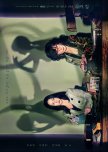
A bittersweet saga of lies, secrets, and acceptance
A family is plunged into a thrilling game of cat and mouse as a mysterious blackmailer threatens to expose their secrets. They race against the clock to uncover the truth, confronting the lies and secrets that have festered in their family along the way. Frustrated, they rally together against a common enemy to protect their ownThe drama takes an unexpected turn when one of the family members (Jae Chan/Do Hyun) comes out. Initially met with doubt and confusion, the family soon realizes that being gay isn't a phase, and that acceptance is more powerful than societal norms. They vow to protect the son/grandson and his truth, no matter the cost. The family emerges from the bitter darkness of their lies, secrets, and betrayals, stronger and more united than before. This act of bravery and acceptance elevates the drama from a typical thriller to a thought-provoking examination of family dynamics
The ending was bittersweet. Jae Chan/Do Hyun was happy with the boy he loved (sweet), the family members "practiced being strangers" (bitter). Family should be a source of unity and strength, not estrangement, and I wished to see them reconcile, walking hand in hand once more
My rating was going to be a 7/10, but the sensitive handling of coming out and support for the gay community deserve an additional 0.5 points. They bumped the final rating to a 7.5/10
Was this review helpful to you?
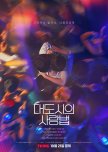
An okay drama that could've been better
My first impression of "Love in the Big City" wasn't entirely favorable (the drama was too depressing for me to handle); however, I was impressed by the cast's performances. One standout was Nam Yoon Su. He took a courageous stand against the homophobic attitudes that plague society by playing a non-straight role and partaking in same-sex intimacy without any reservation. Each kiss, each moment of physical closeness, was an act of trust, a man's willingness to open himself up to another man. The directors' attention to detail and depth was evident in every frame, and it was impossible not to be moved by the beauty of itYoon Su deserves the utmost praise for bringing warmth and sincerity to his scenes. He held nothing back, conveying raw passion and vulnerability in equal measure. His performance left a lasting impression on me, one that was haunting and memorable
Having paid due attention to the positives, I'll analyze the elements that require improvement, as "Love in the Big City," even with its noble efforts to redefine "queer" storytelling, remains short of fulfilling its promise. Among its flaws, none are as detestable as the violation of a gay male space (a gay club) by a "straight" identifying woman (31:07 of episode 1). The sanctity of a gay male space is not to be disturbed, it's a space for men of like mind and heart to be unabashed in their same-sex desires, away from the harsh gaze of the heteronormative society. Entering a single-sex space with the intention of pursuing someone of the opposite sex to carry back to one’s bed reveals a lack of understanding of, and respect for, the space's true purpose
What was that sudden, unceremonious reference to HIV? HIV isn't a gay disease and a character's (homo)sexuality doesn't warrant the inclusion of HIV in a storyline. The doctor's assumption that the main character's HIV was sexually transmitted is inconsistent with his assertion that the chances of transmitting HIV through sex are low (39:50 of episode 5). The main character's life was unaffected by the disease, and there was no reason why he should be among the rare cases of sexual transmission. HIV is being used for dramatic effect
The narrative device of "straight" identifying female characters befriending gay male characters and becoming the medium through which gay stories are told is tiresome and troubling. Why a "straight" identifying woman, and not a gay woman, a fellow member of the community who shares the same struggles and experiences of discrimination? Can't a gay woman and a gay man get along and be depicted as friends for once?
The conclusion of the story was an anticlimactic question mark, tinged with the bitterness of an uncertain future. Sad or open endings are a trademark of most "queer" stories, and their writers seem to have a vendetta against gay happiness. Time and again, the main character experienced the crushing revelation that the men he believed to be his perfect match were either prejudiced against his (homo)sexuality or not a good fit. It pained me to see him isolated and dejected. I find greater comfort in happy BLs/gay stories that celebrate the joy of the romantic fulfillment and validation denied to gay couples. They surpass their sad or open-ended "queer" counterparts
The depiction of a gay person's life prevents me from rating "Love in the Big City" too low. I've decided on a score of 8 that acknowledges the value and the flaws of the story
Was this review helpful to you?
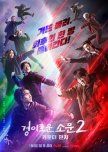
The Uncanny Counter Season 2: Counter Punch
42 people found this review helpful
The Uncanny Counter returned with a charming and stunning 2nd season
Season 2 is an underrated gem. It's a new story with new conflicts and dynamics to watch on its own. The counters navigate a falling out with their firefighter friend. So Moon moves forward and grows stronger for his uncanny family. Jeok Bong's funny clumsiness carries the counters through the darkest times. And So Moon and Ha Na shine bright with their younger brother/older sister dynamicI would have loved to see Gelly, Wong Yeok and Pil Kwang join the counters or the Yung territory flow through So Moon's body. Season 2 could have adapted the part of the webtoon where So Moon, the Yung territory that he is, casts out spirits without having to summon them. But I'm satisfied with the Yung tears So Moon sheds for Ju Seok. They are a sign of his pure heart and strength
The humor, action and level-headed storytelling mesh well together and have plenty of room to breathe. I'm not overwhelmed or frustrated
Retaining the jovial charm of season 1, the 2nd season is a seamless, breezy watch
The uncanny family, thank you for your hard work. I will miss you ☺️
Was this review helpful to you?
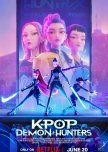
A critical look at "Kpop Demon Hunters"
"Kpop Demon Hunters" leaves much to be desired in terms of its premise and executionFrom the onset, the premise of a bunch of demon hunters drooling over the very demons they're tasked with defeating is frustratingly superficial and distasteful. Where they should be fighting the demons, they're busy ogling and pursuing them
The forced non-platonic exchanges between the male and female idols diminished my interest in their character arcs. There’s zero chemistry between the characters. Their "comedic" facial expressions aren't funny or comedic. And their supposed good looks are exaggerated. They do little to offset the monotony of their bland personas
The demons are subjected to the clichéd "romanticized" treatment that presents them as objects of desire rather than malevolent beings deserving of their fate in the underworld. Several of these demons (Jinu included) have earned their place in hell, having displayed a callous disregard for others. They've betrayed their own kin for self-preservation, and manipulated the truth to appeal to others' feelings
Rumi: "I know your story. You were a good person, and you still are"
Jinu: "I lied to you. I made a deal with Gwi-Ma to get myself out of that miserable life. I left my family alone while I slept on silk sheets in the palace with my belly full every night. I left them" (1:9:50)
Jinu abandoned his loved ones to a life of poverty and starvation to secure comfort and survival. And I'm expected to pity him for his time in hell? Regret doesn't erase his actions
The act of forgiveness rests in the hands of his family, the ones bearing the brunt of his actions. No one else has the right to grant him forgiveness. Not me, not the fans, not the demon hunters. Whatever decision the family makes, be it extending mercy or withholding it, should be respected. However, they might've departed to heaven. We're left with no clarity on where they stand in the matter
The story still brushes the problems aside, trivializing the severity of the demons' past misdeeds, robbing them of accountability, and seeking to evoke unwarranted sympathy for them
They were successful in swaying the public perception of the demons. I've seen fans taking their side. "They didn't deserve it," they say. The truth is, the demons in question aren't misunderstood or fallen angels whose small errors brought about their condemnation
Rumi: "if this is the Honmoon I'm supposed to protect, I'm glad to see it destroyed" (1:14:42)
Rumi, who seconds ago endorsed the destruction of Honmoon, appears at the Saja Boys' concert with a newfound determination to protect it. Neither her change of heart nor her actions are explored. Everything falls flat. The character designs, the dialogues, the decisions made, the songs
There's a notable divide in opinion regarding the songs featured in "Kpop Demon Hunters." Fans assert the superiority of the songs over those of established Kpop artists, and I disagree with them. Numerous Kpop groups, BTS, Stray Kids, ATEEZ, MAMAMOO, ITZY, FIFTY FIFTY, etc, released songs that I'm able to enjoy on a regular basis, on repeat, due to their catchy melodies and meaningful lyrics. I find the tracks from "Kpop Demon Hunters" to be unbearable to listen to more than once
Considering the exceptional bar set by certain Kpop groups, I believe the popularity surrounding "Kpop Demon Hunters" is disproportionate to its merits
TL;DR On a scale of 1 to 10, I'd rate the movie a 2
Was this review helpful to you?
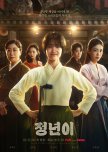
Gay subtext meets historical drama
"She already knows how to make women fall for her without consciously thinking about it ..." (episode 6, 17:43)"I never knew those two [girls] could have such chemistry, they're bringing out the best in each other" (episode 6, 51:47)
"Jeong Nyeon" is more than a glimpse into a woman-centric world of acting. The setting of a woman-only theater that positions women as both the objects and subjects of romantic desire naturally lends itself to a subtextual exploration of same-sex attraction. It's a glimpse into the potential for better gay representation in Korean media
Though the production team’s decision to remove Jeong Nyeon’s female love interest (Kwon Bu Yong) and the explicit same-sex romance is a regrettable concession to society's homophobic expectations (they should've done better), the drama remains commendable for its efforts to integrate elements of gayness throughout the narrative. I was impressed by everyone's performances
"The stars that graced the gukgeuk stage went on to continue their paths as artists, pansori singers, outdoor theatre performers, or even film actors. They have merely dispersed, not disappeared"
That the curtain has fallen on Maeran's story need not spell the end for female gukgeuk. The genre deserves to rise from the ashes, and girls/women should have the chance to soar on its stage again
Was this review helpful to you?
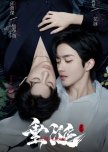
Some tropes are better left unwritten: the omegaverse edition
Omegaverse has infiltrated the world of entertainment nowadays, rearing its head in books, fanfiction, comics, dramas, etc. Invaluable time and money is poured into it when BL/gay media is censored or underappreciated and left to wither in the shadowsAlthough I'm a devoted fan of BL, my devotion doesn't extend to "futanari" and its derivatives (e.g., omegaverse, gender bender). They're at odds with my values and a source of frustration for me for 4 principal reasons:
1. Their homophobia,
2. Their fetishistic appropriation of opposite-sex physical characteristics,
3. Their pro-birth ideology, and
4. Their inaccurate branding as BL/gay content
I'll give a quick rundown of my reasoning
*The homophobia*
-2 points
Society craves children as fodder for its ever-churning, self-destructive machinery of exploitation, and it's this craving that vilifies/demonizes gay relationships. By design, and absent of human greed or undue interference with the body's natural functioning, non-straight relationships are non-procreative, defying the demand for a continuous supply of fresh consumers and workers. The natural deviation from the established norm provokes society's irrational wrath, which manifests in the abhorrent desire to feminize male characters or masculinize female characters. The men are feminized through the imposition of female anatomy (e.g., vulva, vagina, uterus) and capacity for pregnancy, while the women are masculinized through the imposition of male anatomy (e.g., penis, testes) and capacity for impregnation
Characters are warped into paradoxical feminine-masculine hybrids at best, caricatures of the opposite sex at worst. Prisoners of their own bodies, their worth is degraded to that of a factory-grade "impregnating" and/or "birthing" machine. The omegaverse forces of pheromones, heats, and ruts further strip them of the freedom to carve their own paths and relationships. They're unable to break free from the stifling straightness/heteronormativity that defines their everyday interactions
This dystopian perversion of human bodies proves society's true intention: to erase non-straight/non-procreative relationships and maintain its iron grip on conformity
*The fetishistic appropriation of opposite-sex physical characteristics*
-2 points
People pursue what they can't have in an effort to fill a perceived void in their lives. They've at times coveted the womb's capacity to bear life (womb envy) and the penis's association with dominance (penis envy). Moved by the envy, they appropriate the appearances that resemble those of the opposite sex. Their minds wander to a fictional combination of male and female characteristics within a single form; a futa, an omega, or a Frankenstein's monster of sorts
They turn from the truth that the characteristics separating men and women aren't blemishes or shortcomings to be "fixed." Each male or female body is complete in its own right
*The pro-birth ideology*
-2 points
The contention that omegaverse is but a figment of imagination, a whimsical flight of fancy, does little to nullify my objections against it. Beneath the surface is a troubling fetishization of the pregnant form that espouses a pro-birth ideology. Omegaverse contributes to the sociocultural paradigm that sanctifies birth and ascribes it a revered, near-spiritual status
I take the opposite stance that birth holds no inherent beauty. Pregnancy is a grueling, unsightly process that exacts a heavy toll on the body, compromising the well-being of the being that endures it. Furthermore, "procreation" is an egregious imposition of the highest order, an act that binds a new helpless being to the chains of life's trials, tribulations, and uncertainties. Its media glorification is irresponsible and an affront to the very notion of morality
"Not to be born at all
Is best, far best that can befall, ...
... For when youth passes with its giddy train,
Troubles on troubles follow, toils on toils,
Pain, pain for ever pain;
And none escapes life’s coils
Envy, sedition, strife,
Carnage and war, make up the tale of life" (Sophocles, Oedipus at Colonus)
Our society's imperfect. There's no reason to fabricate an alternate pro-birth society burdened with greater cracks and fissures than ours
In the event that one's gripped by a desire to nurture a child, I believe the commendable path towards parenthood would be to consider adoption and provide a secure, loving home to an existing child that's been unfortunate enough to journey through life
*The branding*
-2 points
I believe the capacity for pregnancy is exclusive to women. Men can't experience it, or they'd cease to be men. It's thus incorrect to label as gay or BL the "straight" interactions of fictional characters capable of pregnancy. They belong to a different category
TL;DR The drama earns 2 points for trying, and loses 8 for its omegaverse themes and reluctance to commit to a gay storyline
Was this review helpful to you?





















